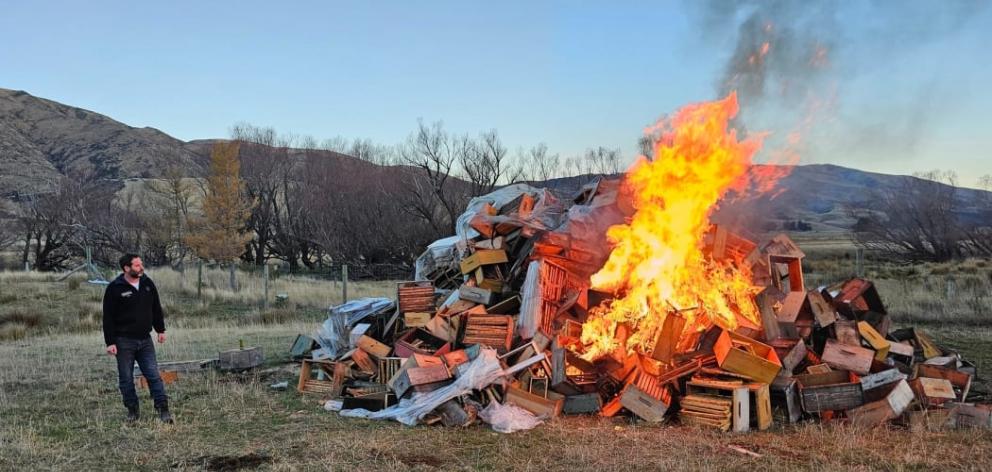
Honey producer Springbank Honey of North Canterbury was ordered to burn more than 10,000 of its beehives and beekeeping equipment after American Foulbrood (AFB) was identified through spore testing.
AFB is a bacterial disease spread by spores that could be viable for up to 40 years. It is considered one of the most widespread and destructive honey bee brood diseases in the world.
The family-owned honey business, operating near Rangiora in North Canterbury, runs 3000 organic beehives and processes honey too.
Co-owner Steven Brown said burning thousands of beehives over Mother's Day weekend had left the family "devastated".
"By next year, when we don't have boxes for our honey crop, we're probably going to be losing over $5-6 million," Brown said.
"The loss of the boxes is one thing, but without the boxes for the hives we won't have a honey crop."
Brown said it would cost around $2 million to replace it all, made more difficult by the fact that there was no compensation or insurance available for beekeepers.
Burning the hives was more painful when other countries used tools like vaccines, antibiotics and sterilisation - measures prohibited in New Zealand and in some export markets.
"Most farmers vaccinate their cows for diseases every single year, but it's illegal to vaccinate the hive," Brown said.
"I don't understand why we have our heads in the sand and live like it's 200 years ago without these amazing abilities of giving a vaccine and stopping disease; instead we burn things."
The order to destroy the hives by fire came from the levy-run management agency that enforces the national pest management plan rules, including auditing beekeepers, monitoring for the disease and eliminating it.
Brown said the new government needed to "shut down immediately" the outdated pest management plan and the agency.
"The plan was supposed to reduce AFB by 5 percent per year, they haven't complied with that. It's gone rampant throughout New Zealand," he said.
"I want the Biosecurity Act changed, but the one we're operating under, the pest management plan, the [Biosecurity] Minister needs to stop that immediately."
 More boxes are added to the bonfire. Photo: Facebook / Steven Brown
Agency aims for support
More boxes are added to the bonfire. Photo: Facebook / Steven Brown
Agency aims for support

But the management agency's general manager, Niha Long said it aimed to support beekeepers impacted by the disease.
She acknowledged how "upsetting" it would be for social media users to view the burning beehives - but burning was the only method at hand.
"The only way to destroy the spores is through burning, so we cannot use antibiotics unlike other countries in the world due to market access," Long said.
She said the agency was not there to make beekeepers' operations harder.
"We acknowledge that it is a significant impact on the beekeeper, but we're not here - contrary to popular belief - to make a beekeeper's life difficult," she said.
"We're here to work with the beekeeper and that is the nature of the relationship we've attempted to have with this beekeeper [Springbank Honey].
"AFB will happen if you're a beekeeper, at some point in your journey, and getting AFB is not the problem - what can be a problem for us is the beekeepers's action or inaction after you've found it."
She said the law and the pest management plan put legal obligations on its registered, levy-paying beekeepers.
"It dictates each beekeeper's responsibility for eliminating AFB, so I'd like to emphasise that that is each beekeeper's responsibility through a set of legal obligations."
Long said fewer than eight percent of the country's 8000 beekeepers were currently affected - and there were 2900 reports of AFB made in the past year to May, down 15 percent on the 3449 reports the year before.
NZ 'pretty much alone'
NZ Beekeeping Incorporated president Jane Lorimer said New Zealand was "pretty much alone" in the response to burn hives and equipment on positive spore tests.
But she said beekeepers generally still followed the rules.
"Beekeepers have to notify and then destroy hives within seven days after finding the disease - and most beekeepers, including Steve, usually comply with that regulation.
"We're going to seek some clarification around the Biosecurity Act and the Pest Management plan and how the two legal aspects integrate."
It was seeking clarification around how the Biosecurity Act and the pest management plans' legal aspects integrated.
She said the government review into the legislation was an opportunity to improve transparency for the sector.
"We hope that the Minister will take into consideration our suggestions [in the review] and make changes accordingly. Part of that is an appeal process as well, there's nothing within the order in council about appealing what's happening when a beekeeper's asked to destroy equipment they've found spores in.
"This isn't the first case where beekeepers had been told to destroy beekeeping equipment that they'd found spores in."
Lorimer said it was a difficult time for the industry, and the number of commercial beehives had halved in the past two years.













